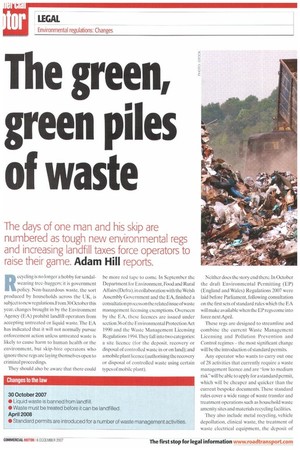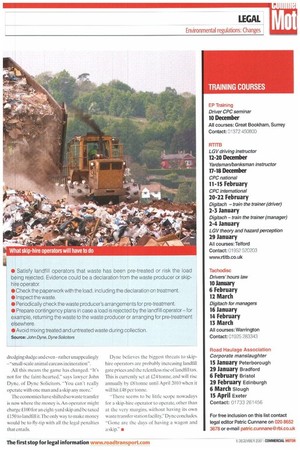The green, C.
Page 36

Page 37

If you've noticed an error in this article please click here to report it so we can fix it.
green piles of waste
The days of one man and his skip are numbered as tough new environmental regs and increasing landfill taxes force operators to raise their game. Adam Hill reports.
Recycling is no longer a hobby for sandalwearing tree-huggers; it is government policy. Non-hazardous waste, the sort produced by households across the UK, is subject to new regulations.From 30 October this year. changes brought in by the Environment Agency (EA) prohibit landfill operators from accepting untreated or liquid waste. The EA has indicated that it will not normally pursue enforcement action unless untreated waste is likely to cause harm to human health or the environment, but skip-hire operators who ignore these regs are laying themselves open to criminal proceedings.
They should also be aware that there could be more red tape to come. In September the Department for Environment. Food and Rural Affairs (Defra), in collaboration with the Welsh Assembly Government and the EA, finished a consultation process on the related issue of waste management licensing exemptions. Overseen by the EA, these licences are issued under section 36 of the Environmental Protection Act 1990 and the Waste Management Licensing Regulations 1994. They fall into two categories: a site licence (for the deposit, recovery or disposal of controlled waste in or on land); and a mobile plant licence (authorising the recovery or disposal of controlled waste using certain types of mobile plant). Neither does the story end there. In October the draft Environmental Permitting (EP) (England and Wales) Regulations 2007 were laid before Parliament. following consultation on the first sets of standard rules which the EA will make available when the EP regs come into force next April.
These regs are designed to streamline and combine the current Waste Management Licensing and Pollution Prevention and Control regimes — the most significant change will be the introduction of standard permits.
Any operator who wants to carry out one of 28 activities that currently require a waste management licence and are -low to medium risk" will be able to apply fora standard permit, which will be cheaper and quicker than the current bespoke documents. These standard rules cover a wide range of waste transfer and treatment operations such as household waste amenity sites and materials recycling facilities.
They also include metal recycling, vehicle depollution, clinical waste, the treatment of waste electrical equipment, the deposit of dredging sludge and even—rather unappealingly —"small-scale animal carcass incineration".
All this means the game has changed. "It's not for the faint-hearted," says lawyer John Dyne, of Dyne Solicitors. "You can't really operate with one man and a skip any more."
The economics have shifted so waste transfer is now where the money is. An operator might charge £100 for an eight-yard skip and be taxed £150 to landfill it.The only way to make money would be to fly-tip with all the legal penalties that entails. Dyne believes the biggest threats to skiphire operators are probably increasing landfill gate prices and the relentless rise of landfill tax. This is currently set at f24/tonne, and will rise annually by £8/tonne until April 2010 when it will hit £48 per tonne.
"There seems to be little scope nowadays for a skip-hire operator to operate, other than at the very margins, without having its own waste transfer station facility," Dyne concludes. "Gone are the days of having a wagon and a skip." •


























































































































































































